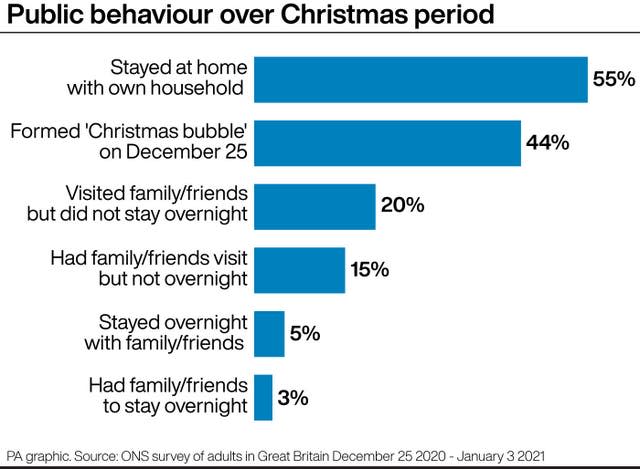Four in 10 adults in Britain formed Christmas Day bubble – ONS
Four in 10 adults in Britain formed a bubble to celebrate Christmas Day, figures suggest.
Some 44% of adults in England, Scotland and Wales said they formed a Christmas bubble on December 25, the Office for National Statistics (ONS) said.
The same proportion said they had not done so, while 10% said this was not permitted in their area.
Families had hoped to take advantage of a five-day relaxation of restrictions to meet family members and friends indoors.
But on the weekend before Christmas, this was pared back to three households being allowed to meet for one day, and removed entirely for 18 million people in England in Tier 4 who were not allowed to meet people outside their household or support bubble.
Scotland and Wales also restricted Christmas bubbles to a single day, with bubbles in Wales limited to two households.

The ONS analysed 3,756 responses from adults aged 16 and over between December 22 and January 3, with 2,320 people asked about their Christmas Day activities, as part of its Opinions and Lifestyle Survey.
Over the festive period, more than half (55%) of respondents said they had stayed at home with their household.
One in five (20%) said they had visited family or friends in their homes but not stayed overnight, while 15% said they had received visitors who did not stay overnight.
Five per cent said they had stayed with family or friends for at least one night, while 3% said they had hosted overnight visitors.
Around one in five adults surveyed (18%) said they found it very difficult or difficult to follow the Government’s rules during the festive period.
Almost half (48%) of this group said this was because they had already made plans by the time the Government changed its position on what was permitted over the festive period.
Among those who reported being unlikely to take the vaccine (7%), the most common reasons were
▪️ worry about side effects▪️ worry about long-term effects on their health▪️ wanting to wait to see how well the vaccine works
— Office for National Statistics (ONS) (@ONS) January 8, 2021
Some 42% said this was because they wanted to see family or friends on days other than December 25, and 35% said they wanted to maintain family or Christmas traditions.
The ONS also asked people about the largest group they had socialised with indoors over the past seven days, excluding for work or education.
Around 64% of people said they had met up with at least one person indoors, and, of this group, 44% said this included people from outside their household or support bubble.
Nine per cent said they had spent between one and more than five days with the group they met.
And 55% said the reason for meeting was to see friends or family.
The ONS also found a rise in people saying they are likely or highly likely to have a coronavirus vaccine, with 85% of people reporting this.
This compares with 78% of respondents between December 10 and 13.
The first vaccine to be approved was the Pfizer/BioNTech jab in early December.
Approval of the Oxford/AstraZeneca vaccine followed on December 30.
Seven per cent of adults said they were very or fairly unlikely to take up a vaccine if offered.
More than half (51%) said this was because they were worried about the side-effects or long-term impact on their health, and 47% said they wanted to wait to see how well the vaccine works.

 Yahoo Finance
Yahoo Finance 